Expedia Group Bundle
How Does Expedia Group Navigate the Travel Industry?
Expedia Group, a titan in the online travel agency (OTA) landscape, continues to redefine how we explore the world. With billions in annual revenue, the company's influence is undeniable. Its vast portfolio of brands, including Expedia and Hotels.com, caters to a global audience seeking seamless travel booking experiences.
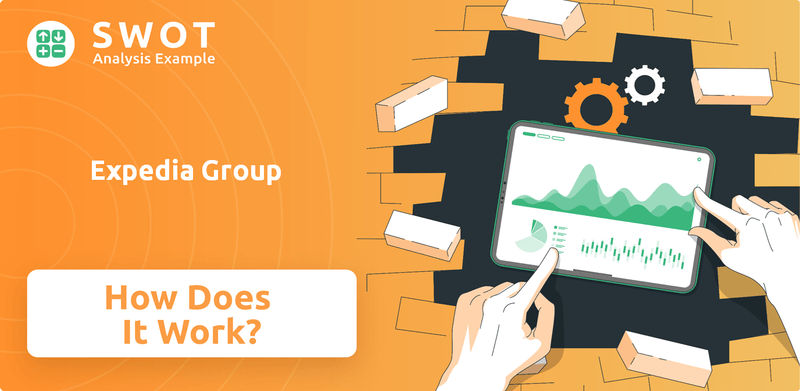
This exploration will dissect Expedia Group's Expedia Group SWOT Analysis, revealing its operational intricacies and strategic positioning within the dynamic travel industry. Understanding the Expedia Group business model is key for investors and anyone interested in the future of travel booking. We'll delve into how Expedia makes money, examining its diverse revenue streams and competitive advantages in the face of evolving consumer demands and market trends, including Expedia flights booking process and Expedia hotels booking process.
What Are the Key Operations Driving Expedia Group’s Success?
Expedia Group functions as a leading online travel agency (OTA), primarily serving individual travelers and travel suppliers. It creates value by offering a comprehensive marketplace for travel services, including flights, hotels, vacation rentals, car rentals, and activities. The company's operations are heavily reliant on advanced technology, such as sophisticated search algorithms and data analytics, to facilitate seamless transactions and personalized recommendations.
The company's value proposition centers on aggregating a vast inventory of travel options, providing competitive pricing, and offering convenience through a single platform. For travel suppliers, Expedia Group provides broad distribution channels and marketing reach, connecting them with a global customer base. The operational backbone involves managing complex relationships with various travel service providers.
Expedia Group's core operations are unique due to its multi-brand strategy, allowing it to cater to different customer segments. This approach leverages shared technology infrastructure and supplier relationships. This scale translates into customer benefits through wider choices and competitive pricing, while also providing suppliers with efficient access to a large market.
Expedia Group provides a wide array of travel services, including flights, hotels, vacation rentals, car rentals, and activities. These services are accessible through various brand websites and mobile applications. The company's offerings cater to a diverse range of travel needs and preferences.
The company relies heavily on advanced technology, including sophisticated search algorithms, booking engines, and data analytics platforms. These technologies facilitate seamless transactions and personalized recommendations. This infrastructure is crucial for managing vast amounts of data and providing efficient services.
For travelers, Expedia Group offers a vast inventory of travel options, competitive pricing, and convenience through a single platform. This includes access to a wide range of choices, making it easier for customers to plan and book their trips. The platform's user-friendly interface enhances the overall travel booking experience.
Expedia Group provides broad distribution channels and marketing reach for travel suppliers, connecting them with a global customer base. This allows suppliers to increase their visibility and reach a wider audience. The platform offers efficient access to a large market, helping suppliers to maximize their revenue.
Expedia Group's operational effectiveness is enhanced through partnerships with global payment processors and customer service centers. The company's multi-brand strategy allows it to cater to different customer segments. The company's business model is designed to maximize efficiency and customer satisfaction.
- Multi-Brand Strategy: Operating multiple brands allows the company to target different customer segments and travel needs.
- Technology: Utilizes advanced search algorithms and booking engines for efficient operations.
- Supplier Relationships: Manages complex relationships with airlines, hotels, and other travel providers.
- Customer Service: Provides customer support to ensure a positive user experience.
Expedia Group SWOT Analysis
- Complete SWOT Breakdown
- Fully Customizable
- Editable in Excel & Word
- Professional Formatting
- Investor-Ready Format
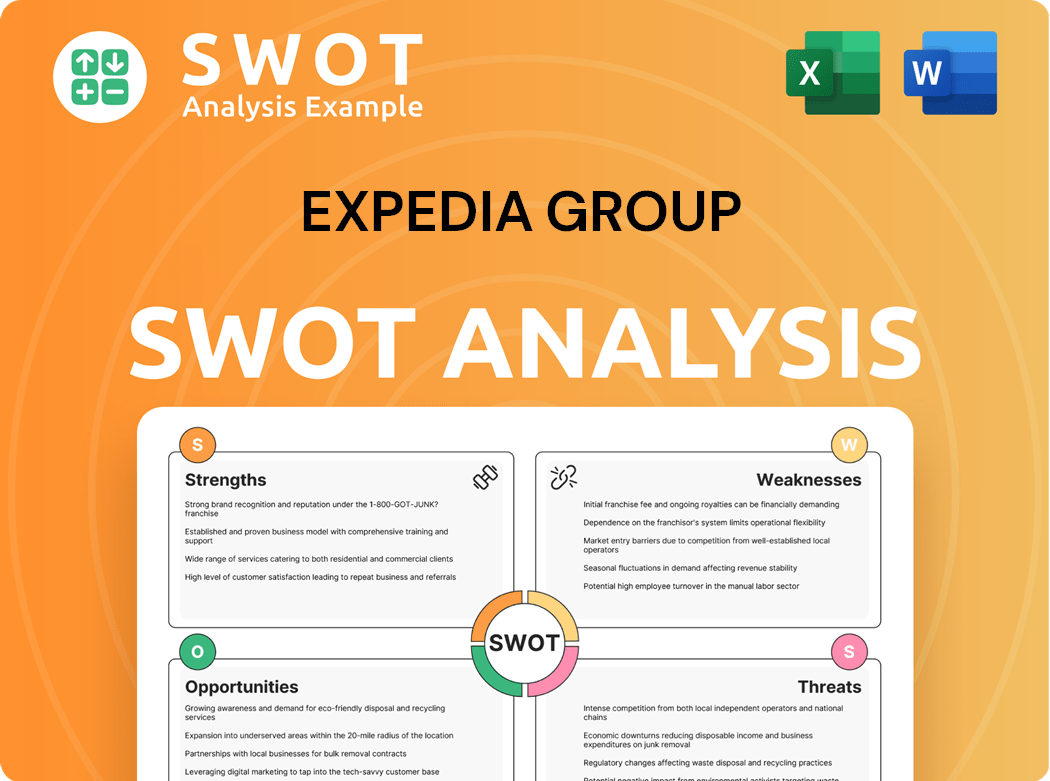
How Does Expedia Group Make Money?
Expedia Group, a leading online travel agency (OTA), generates revenue through various streams, primarily categorized into Retail and B2B segments. The company's diverse monetization strategies fuel its operations within the competitive travel industry. Understanding these revenue models is crucial for assessing Expedia's financial performance and market position.
In 2023, Expedia Group reported total revenues of approximately $12.8 billion, demonstrating its significant presence in the travel booking market. The company leverages commissions, fees, and strategic partnerships to maximize its earnings. This approach allows Expedia to adapt to market changes and maintain its competitive edge.
The Retail segment, which includes platforms like Expedia.com and Hotels.com, forms a significant portion of Expedia Group's revenue. This segment's revenue comes from commissions on hotel bookings, booking fees for flights and car rentals, and service fees on vacation rentals. Expedia's ability to offer a wide range of travel options and services contributes to its revenue generation.
The Retail segment's revenue is primarily derived from commissions and fees associated with travel bookings. Expedia Group earns a percentage commission from hotels for each booking made through its platforms. Additional income is generated from booking fees for flights and car rentals. The company also charges service fees on vacation rentals, contributing to its overall revenue.
- Commissions: Expedia earns commissions from hotels, airlines, and car rental companies for each booking made through its platforms.
- Booking Fees: Fees are charged for flight and car rental bookings.
- Service Fees: Service fees are applied to vacation rentals.
- Advertising: Revenue from advertising and media services, where travel suppliers promote their offerings on Expedia Group's platforms.
The B2B segment, encompassing Expedia Partner Solutions (EPS) and Expedia Affiliate Network (EAN), provides technology and travel products to other businesses. This segment generates revenue through transactions where other businesses utilize Expedia Group's supply and technology to power their own travel offerings. This segment allows Expedia to diversify its revenue streams. If you're interested in the company's ownership structure, you can find more information in Owners & Shareholders of Expedia Group.
The B2B segment focuses on providing technology and travel products to other businesses. This includes offering technology and wholesale travel products through Expedia Partner Solutions (EPS) and Expedia Affiliate Network (EAN). The company earns revenue when other businesses use its supply and technology to power their travel offerings.
- EPS (Expedia Partner Solutions): Provides technology and travel products to other businesses.
- EAN (Expedia Affiliate Network): Offers travel products to affiliates.
- Wholesale Travel: Revenue from providing wholesale travel products.
Expedia Group also employs bundled services to increase revenue. Travelers can book flights and hotels together at discounted rates, encouraging higher spending. The company continuously explores new revenue sources, such as leveraging user data for targeted advertising and expanding B2B partnerships. These strategies help Expedia Group maintain its competitive advantage in the online travel agency market.
Expedia Group PESTLE Analysis
- Covers All 6 PESTLE Categories
- No Research Needed – Save Hours of Work
- Built by Experts, Trusted by Consultants
- Instant Download, Ready to Use
- 100% Editable, Fully Customizable
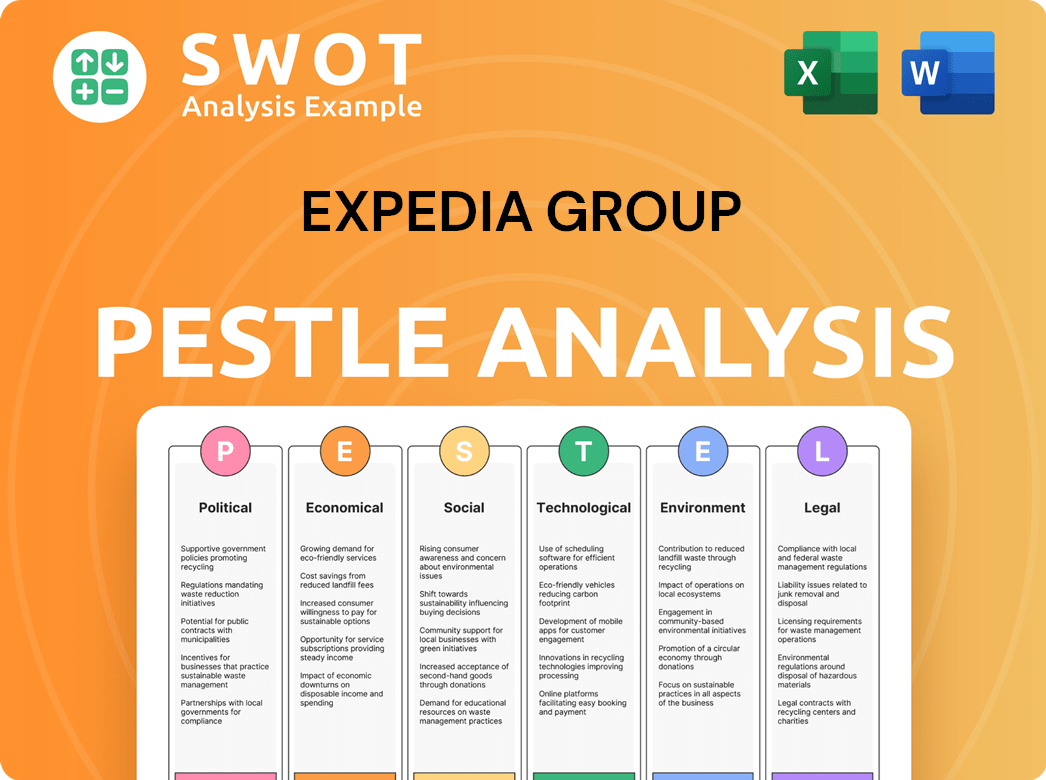
Which Strategic Decisions Have Shaped Expedia Group’s Business Model?
The journey of Expedia Group has been marked by significant milestones and strategic moves that have shaped its position in the online travel agency (OTA) market. A key move was the acquisition of Vrbo (formerly HomeAway) in 2015 for $3.9 billion, significantly expanding its footprint in the vacation rental market. This strategic acquisition allowed Expedia Group to diversify its offerings beyond traditional hotels and flights, directly challenging competitors like Airbnb and tapping into the growing demand for alternative accommodations.
Expedia Group has consistently invested in technology to enhance user experience and operational efficiency. The company's focus on artificial intelligence and machine learning has been instrumental in improving personalization and providing more relevant search results and recommendations for travelers. This technological prowess has been a key factor in maintaining a competitive edge in the dynamic travel booking industry.
The company has navigated significant challenges, particularly during the COVID-19 pandemic, which severely impacted the travel sector. Expedia Group responded by focusing on cost efficiencies and adapting its business model to the changing travel landscape, including promoting more flexible booking options to regain consumer trust. Its ability to adapt and innovate has been crucial for its sustained performance.
The acquisition of Vrbo in 2015 for $3.9 billion expanded Expedia Group's vacation rental offerings. This strategic move diversified the company's portfolio and challenged competitors like Airbnb. This expansion allowed Expedia Group to cater to a broader range of traveler preferences and market segments.
Ongoing investment in artificial intelligence and machine learning has enhanced personalization and user experience. Focusing on cost efficiencies and adapting to changing travel trends, especially during the COVID-19 pandemic, has been crucial. These moves have helped Expedia Group to maintain its competitive edge in the travel industry.
A strong brand portfolio fosters customer loyalty and broad market reach. The vast inventory available on its platforms allows for favorable supplier terms. Technology leadership, especially in data analytics, optimizes search results and user experience. Furthermore, Expedia Group continues to innovate by investing in sustainable travel initiatives.
In 2024, Expedia Group continues to focus on enhancing its platform to meet evolving consumer demands. The company is investing in AI to improve user experience and streamline the travel booking process. They are also exploring new payment solutions to remain competitive. To learn more about their target audience, read this article about the Target Market of Expedia Group.
Expedia Group's competitive advantages include a strong brand portfolio, which fosters customer loyalty and broad market reach. The sheer volume of inventory available through its platforms provides economies of scale, allowing it to negotiate favorable terms with suppliers. Furthermore, its technology leadership, particularly in data analytics and platform development, gives it an edge in optimizing search results, pricing, and user experience.
- Strong brand recognition and customer loyalty.
- Extensive inventory and economies of scale.
- Technological advancements in data analytics and platform development.
- Adaptation to market trends, including sustainable travel.
Expedia Group Business Model Canvas
- Complete 9-Block Business Model Canvas
- Effortlessly Communicate Your Business Strategy
- Investor-Ready BMC Format
- 100% Editable and Customizable
- Clear and Structured Layout
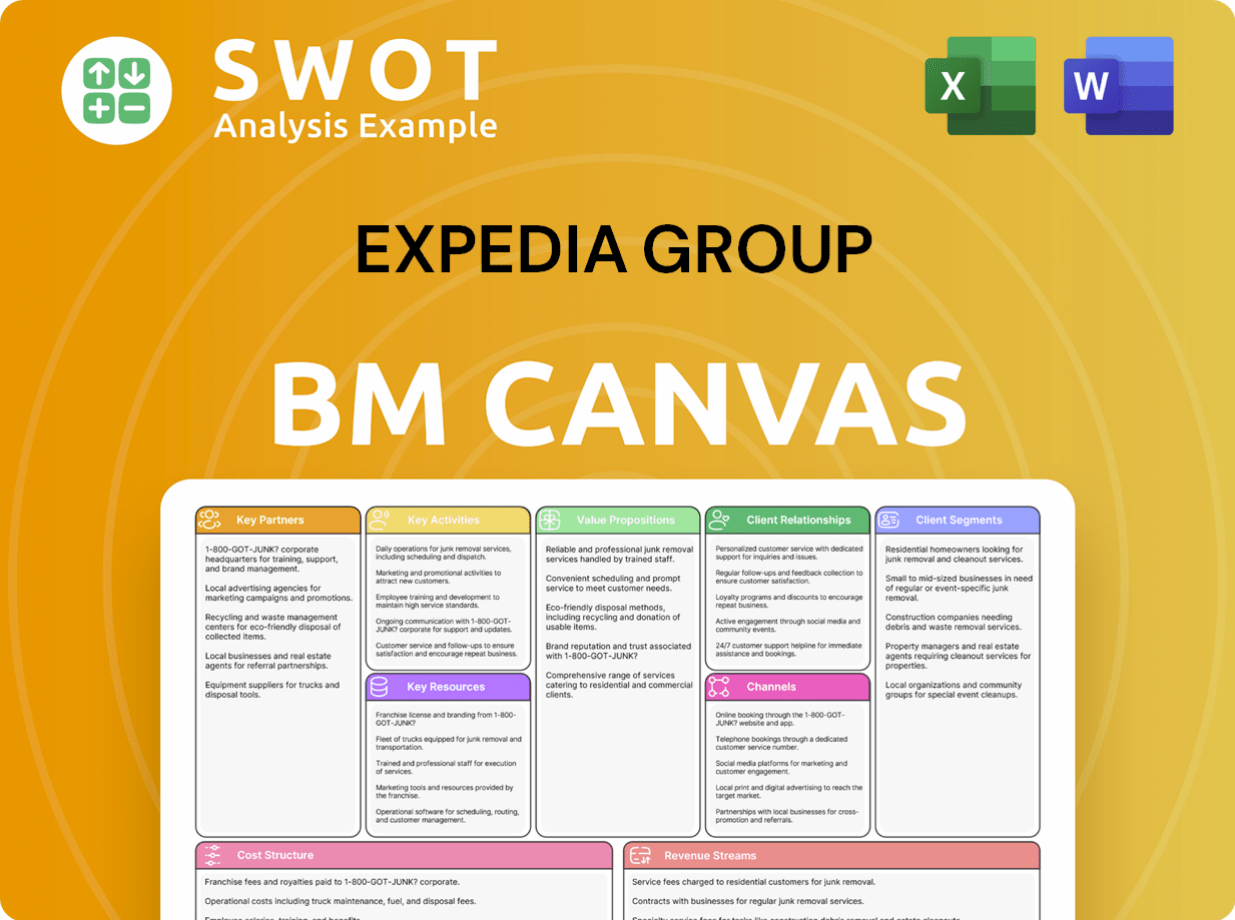
How Is Expedia Group Positioning Itself for Continued Success?
Expedia Group holds a significant position in the global online travel agency (OTA) market. It competes with major players like Booking Holdings and faces competition from direct bookings and vacation rental companies. Expedia Group is consistently among the top online travel companies worldwide, serving millions of travelers across numerous countries.
The company faces various risks, including regulatory changes, intense competition, and technological disruptions. Changing consumer preferences and geopolitical events also pose challenges. Despite these risks, Expedia Group is focused on innovation and adapting to market dynamics to maintain its position in the travel industry.
Expedia Group is a leading online travel agency (OTA) with a strong global presence. It competes with other major OTAs and direct suppliers. The company benefits from strong brand recognition and a loyal customer base, serving millions of travelers annually.
Key risks include regulatory changes, intense competition from OTAs and direct suppliers, and technological disruptions. Changing consumer preferences and geopolitical events also pose challenges. These factors can impact the company's market position and financial performance.
Expedia Group plans to invest in artificial intelligence and machine learning to enhance personalization. It aims to integrate its brands for a better user experience and expand B2B partnerships. The company focuses on innovation and long-term growth in the global travel industry.
In recent financial reports, Expedia Group has shown recovery in travel booking. The company's focus on operational efficiencies and managing its cost structure is crucial. Data indicates a sustained effort to drive revenue growth and maintain profitability in a competitive market.
Expedia Group is focusing on leveraging data to improve marketing and conversion rates. It is also diversifying its product offerings to meet evolving consumer needs. The company's strategy includes ongoing innovation and adaptation to maintain its market leadership.
- Investment in AI and machine learning for enhanced personalization.
- Further integration of its diverse brands for a seamless user experience.
- Expansion of B2B partnerships to drive revenue growth.
- Focus on operational efficiencies to manage costs effectively.
Expedia Group Porter's Five Forces Analysis
- Covers All 5 Competitive Forces in Detail
- Structured for Consultants, Students, and Founders
- 100% Editable in Microsoft Word & Excel
- Instant Digital Download – Use Immediately
- Compatible with Mac & PC – Fully Unlocked
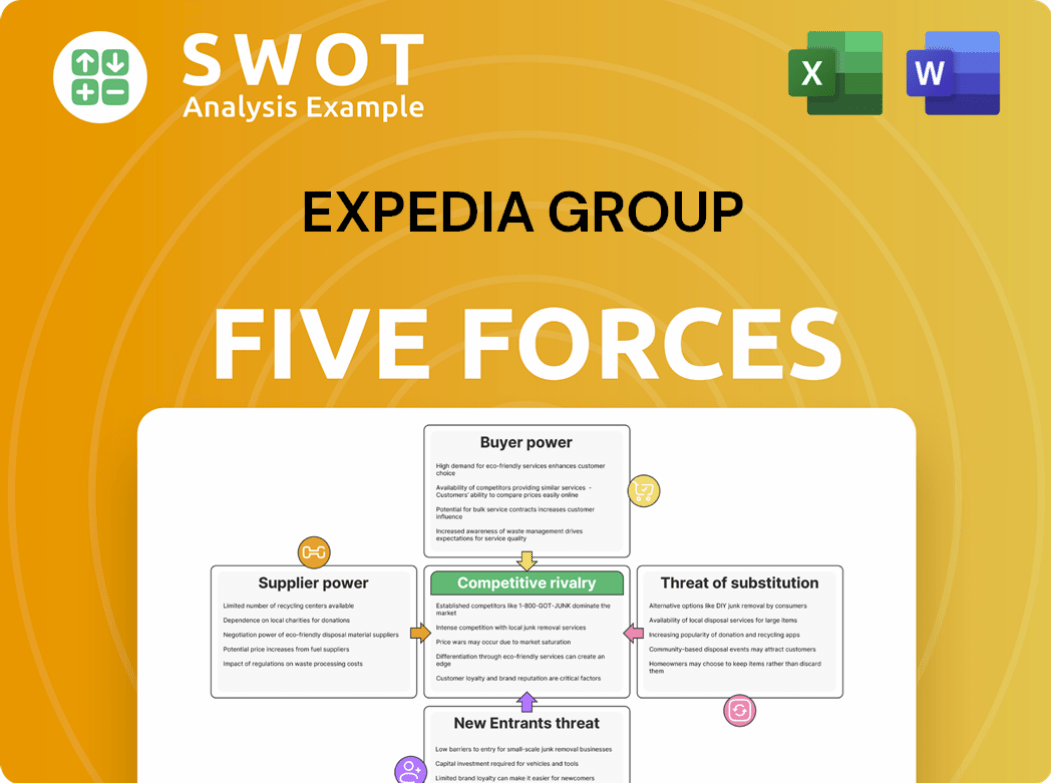
Related Blogs
- What are Mission Vision & Core Values of Expedia Group Company?
- What is Competitive Landscape of Expedia Group Company?
- What is Growth Strategy and Future Prospects of Expedia Group Company?
- What is Sales and Marketing Strategy of Expedia Group Company?
- What is Brief History of Expedia Group Company?
- Who Owns Expedia Group Company?
- What is Customer Demographics and Target Market of Expedia Group Company?
Disclaimer
All information, articles, and product details provided on this website are for general informational and educational purposes only. We do not claim any ownership over, nor do we intend to infringe upon, any trademarks, copyrights, logos, brand names, or other intellectual property mentioned or depicted on this site. Such intellectual property remains the property of its respective owners, and any references here are made solely for identification or informational purposes, without implying any affiliation, endorsement, or partnership.
We make no representations or warranties, express or implied, regarding the accuracy, completeness, or suitability of any content or products presented. Nothing on this website should be construed as legal, tax, investment, financial, medical, or other professional advice. In addition, no part of this site—including articles or product references—constitutes a solicitation, recommendation, endorsement, advertisement, or offer to buy or sell any securities, franchises, or other financial instruments, particularly in jurisdictions where such activity would be unlawful.
All content is of a general nature and may not address the specific circumstances of any individual or entity. It is not a substitute for professional advice or services. Any actions you take based on the information provided here are strictly at your own risk. You accept full responsibility for any decisions or outcomes arising from your use of this website and agree to release us from any liability in connection with your use of, or reliance upon, the content or products found herein.